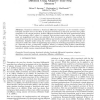Free Online Productivity Tools
i2Speak
i2Symbol
i2OCR
iTex2Img
iWeb2Print
iWeb2Shot
i2Type
iPdf2Split
iPdf2Merge
i2Bopomofo
i2Arabic
i2Style
i2Image
i2PDF
iLatex2Rtf
Sci2ools
CORR
2010
Springer
2010
Springer
Computational efficiency of fractional diffusion using adaptive time step memory
Abstract: Numerical solutions to fractional differential equations can be extremely computationally intensive due to the effect of non-local derivatives in which all previous time points contribute to the current iteration. In finite difference methods this has been approximated using the 'short memory effect' where it is assumed that previous events prior to some certain time point are insignificant and thus not calculated. Here we present an adaptive time method for smooth functions that is computationally efficient and results in smaller errors during numerical simulations. Sampled points along the system's history at progressively longer intervals are assumed to reflect the values of neighboring time points. By including progressively fewer points as a function of time, a temporally `weighted' history is computed that includes contributions from the entire past of the system, resulting in increased accuracy, but with fewer points actually calculated, which ensur...
Related Content
| Added | 09 Dec 2010 |
| Updated | 09 Dec 2010 |
| Type | Journal |
| Year | 2010 |
| Where | CORR |
| Authors | Brian P. Sprouse, Christopher L. MacDonald, Gabriel A. Silva |
Comments (0)

